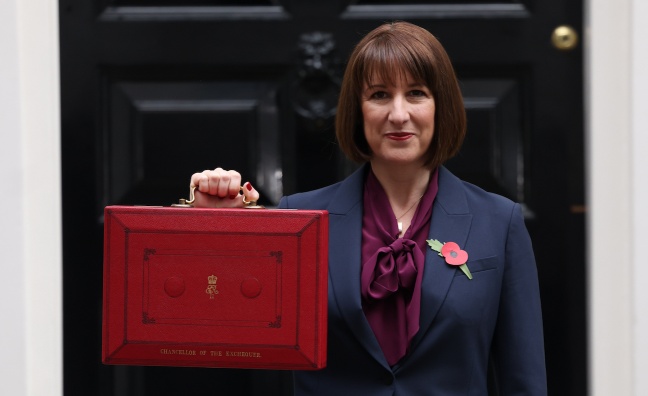Music Venue Trust CEO Mark Davyd has warned that hundreds of grassroots venues are at “immediate risk of closure” in the wake of Chancellor Rachel Reeves first Budget (October 30).
The headline changes included a £40 billion increase in taxes with employers set to pay higher National Insurance for employees (up from 13.8% to 15%). The threshold will also be lowered to £5,000. However, Employment Allowance will increase from £5,000 to £10,500 to help smaller businesses.
Meanwhile, Capital Gains Tax will rise from 10% to 18%, with the higher rate up from 20% to 24%.
The most significant change for the music sector, and particularly small venues, is on tax relief on business rates for the retail, hospitality and leisure industries. Reeves has announced a 40% relief in these sectors in 2025/26, up to a cap of £110,000.
A 75% discount on business rates is due to expire in April 2025, following concessions made during the pandemic. While it means that businesses won’t face a business rates bill quadrupling, which would have been the case with any reversion to a zero-rated tax relief, it still means that many will have to pay more than double the current rate after next April.
For the Music Venue Trust, it’s a decision that they say will prove challenging for many operators in the sector.
Mark Davyd, CEO of Music Venue Trust, said: “£7 million in new premises taxes places over 350 grassroots music venues at immediate risk of closure. Despite extensive briefing to HM Treasury, Department of Culture, Media and Sport and Department for Business and Trade about the negative economic, social and cultural impacts of the removal of the 75% business rate relief for grassroots music venues, the government has today announced that business rate relief will reduce to 40% from April 1st, 2025. The immediate impact is to create a demand for £7 million in additional premises taxes from a sector that, in 2023, returned an entire gross profit across all 830 such venues in the UK of just £2.9 million. 43% of grassroots music venues in the UK made a loss in 2023.
“Over 350 grassroots music venues are now placed at immediate risk of closure, representing the potential loss of more than 12,000 jobs, over £250 million in economic activity and the loss of over 75,000 live music events. Simultaneously with announcing this new tax demand, the government acknowledged the faults and inequities inherent in the business rate system, promising to deliver a new lower rate of taxes on physical, hospitality and leisure premises in April 2026.”
Over 350 grassroots music venues are now placed at immediate risk of closure
Mark Davyd
While Davyd welcomed potential changes in the years ahead, he said that “will be of no use for the hundreds of music venues that are now likely to be lost before this challenge is finally met with a full, long overdue reform”.
In the short term, he suggested potential solutions including a rethink on rates relief, an emergency fund or the introduction of a levy on arenas and stadiums to support grassroots venues.
Here, Music Week rounds up the rest of the music sector’s reaction to the 2024 Budget...
UK Music chief executive Tom Kiehl
“The Budget, Labour’s first in government for 14 years, is a significant moment as we seek to grow the music industry over the course of this new Parliament. The sector is made up of many small and medium enterprises. Increasing the Employment Allowance to £10,500 will hopefully help many of these music businesses, which contribute greatly to the industry’s economic contribution of £7 billion, navigate some of the challenges ahead.
“Business rates continue to present a big challenge for many creative businesses, from venues, record stores and studios. The continuation of business rate relief should be welcome, yet at a reduced rate of relief of 40% will mean further interventions will be necessary to support this delicate part of our ecosystem.”
“It is welcome to see government put further funding into the Creative Careers Programme, but as it takes forward a curriculum review to potentially expand creative education this needs to be supported by further investment to ensure we overcome inequality of opportunity to support the industry’s future talent pipeline.”
"AIM commends the government's actions to extend business rates reliefs for the hospitality sector. However, much more support is needed to alleviate the pressures on already super-squeezed independent labels and related music businesses. These homegrown businesses are the beating heart of music – the principal investors in emerging artists and the UK music sector's key employers, putting out 80% of new releases and creating long-term sustainable creative careers. We urgently need a tax credit scheme for music creation, like that which has been so successful in supporting the UK film sector. This would drive growth in music communities across the length and breadth of the UK, keep options open for a diverse range of musicians, grow employment and investment in emerging music, and reinvigorate the UK's position in the global music market."
"We recognise that the Chancellor has had to make tough choices today. We welcome the retention of business rates relief but the decision to reduce this relief will increase costs on grassroots music venues already struggling to keep their doors open. The live music sector is a key contributor to economic growth, generating over £6bn in 2023, and creating positive social, cultural, and economic impact across every city, town and village in the UK. It is critical that the next Budget focuses on growth and enables sectors like live music to achieve their full potential."
Lyle Bignon, NTE Ambassador for Birmingham (NTIA)
"The Chancellor's Autumn Budget statement appears to be an act of wilful vandalism as far as the UK's fifth-biggest industry, the Night Time Economy, is concerned.
“Rather than delivering the change, renewal, and investment promised, Rachel Reeves has instead directly snubbed small and medium-sized businesses working in culture, hospitality, and the NTE across the country."











